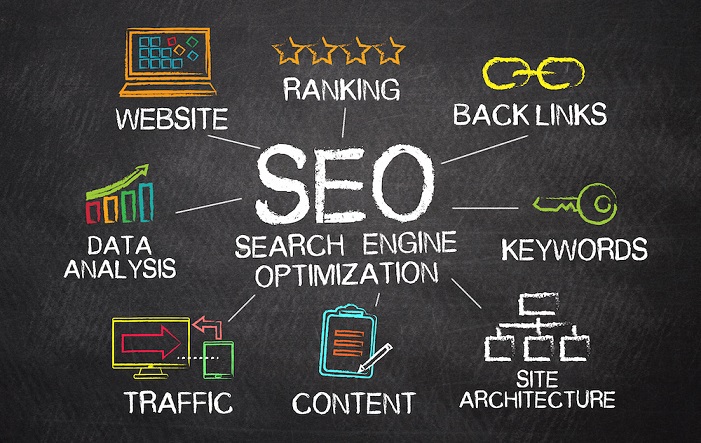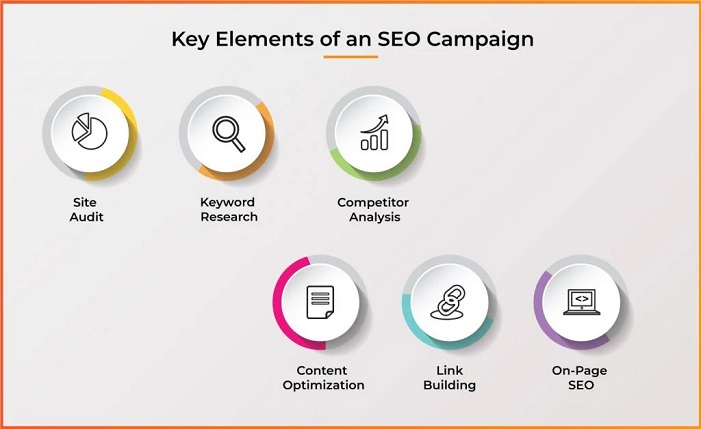Search Engine Optimization (SEO) is a key tool in digital marketing. Whether you’re running a business, writing blogs, or trying to grow your online presence, understanding SEO is essential. It helps your website rank higher on search engines like Google. The higher your ranking, the more people can find you online. Let’s dive into how SEO works and how you can improve your site’s ranking.
What is Search Engine Optimization?

SEO stands for Search Engine Optimization. It is a method used to make your website more appealing to search engines. By making changes to your website’s content and structure, you can increase the chances of your site appearing at the top of search results. When people search online for something relevant to your business, a well-optimized website will help them find you faster.
SEO is not just about focusing on what search engines want; it’s also about giving your visitors the best experience. Quality content that answers their questions and is easy to navigate will keep visitors coming back.
Why SEO Matters for Your Website
SEO is crucial for online visibility. When you search something on Google, how often do you scroll past the first page? Most people don’t. In fact, research shows that nearly 75% of users never look beyond the first page of search results. So, if you want people to find your website, you need to be on that first page.
Without SEO, your website could be hidden in the vast sea of search results, no matter how great your products or services are. Good SEO ensures that your website shows up when people search for topics related to your business. This boosts your visibility and brings more traffic to your site.
Key Components of SEO

SEO is made up of several important factors. Let’s break them down:
1. On-Page SEO
On-page SEO refers to the elements on your website that you can control directly. These factors affect how search engines rank your site.
Keyword Optimization
Keywords are terms that people type into search engines. For example, if you’re writing about SEO, your keyword might be “search engine optimization.” Using these keywords correctly is key. It’s important to put them in your page titles, headings, and throughout your content. But don’t overdo it—keyword stuffing can hurt your SEO. Instead, aim to use them naturally so they fit the context of your content.
Title Tags and Meta Descriptions
Title tags are what appear in search engine results. They should be concise and include your keyword. Similarly, meta descriptions give a brief preview of what your page is about. Both need to be compelling to get people to click on your link. Instead of a generic title like “SEO Tips,” try something like “Top 10 SEO Tips to Improve Your Website Ranking.”
Content Quality
Content quality is one of the most important factors in SEO. Search engines like Google reward pages that provide useful, engaging, and well-written content. When writing content, always keep your audience in mind. Make sure you’re answering their questions and providing valuable information. This helps you build trust with both users and search engines.
2. Off-Page SEO
Off-page SEO is about actions you take outside of your website to improve its ranking. This includes building backlinks, getting social media mentions, and increasing brand awareness.
Link Building
When reputable websites link to your page, it signals to Google that your site is trustworthy and valuable. This is called backlinking. The more quality backlinks you have, the better your site’s reputation becomes. Ways to build backlinks include guest blogging, sharing content with influencers, or being listed in reputable online directories.
Social Media Engagement
Though not a direct ranking factor, social media is still important for SEO. When people share your content on platforms like Facebook or Twitter, it increases visibility and drives traffic to your site. These interactions show Google that people are engaging with your content, which can indirectly improve your rankings.
3. Technical SEO
Technical SEO focuses on improving the technical aspects of your website to ensure that it’s easy for search engines to crawl and index your site.
Website Speed
Website speed is important for both user experience and SEO. If your website takes too long to load, people might leave before even seeing your content. Search engines like Google also prefer fast websites and may rank them higher. Use tools like Google PageSpeed Insights to check your website speed and make improvements where necessary.
Mobile-Friendliness
More people are browsing the web on mobile devices than ever before. Google now uses mobile-first indexing, which means it looks at the mobile version of your site before the desktop version. Make sure your website is mobile-friendly by using responsive design. This ensures that it works well on smartphones and tablets, leading to better user experiences and higher rankings.
URL Structure
Your website’s URLs should be simple and easy to read. A clean URL helps both search engines and users understand what the page is about. For example, instead of a URL like www.yoursite.com/page123, go for something like www.yoursite.com/seo-guide. This is more descriptive and user-friendly.
How to Improve Your SEO

Improving SEO doesn’t happen overnight, but there are several strategies you can implement right away to start seeing better results.
-
Focus on User Intent: People search for information, so make sure your content matches what they’re looking for. Use tools like Google Keyword Planner to find popular search queries and include them in your content.
-
Update Older Content: Don’t forget about old blog posts or pages on your site. Update them with fresh information, relevant keywords, and improved readability to keep them useful for users.
-
Use Internal Linking: Internal links help search engines understand the structure of your website. They also guide users to other helpful content on your site, keeping them engaged longer.
-
Leverage Structured Data: Adding structured data, or schema markup, helps search engines understand your content better. This can result in rich snippets or enhanced listings in search results.
-
Track Performance: Use Google Analytics to track how your website is performing. It helps you identify what’s working and what isn’t. Keep optimizing your site based on this data.
Common SEO Mistakes to Avoid

There are several mistakes that can hurt your SEO efforts. Here are a few to watch out for:
-
Ignoring Mobile Users: Since Google now prioritizes mobile-first indexing, a website that isn’t mobile-friendly can hurt your ranking.
-
Skipping Local SEO: If you have a local business, local SEO is crucial. Make sure your business is listed on Google My Business and other local directories to improve visibility.
-
Using Duplicate Content: Search engines don’t like duplicate content. If you have multiple pages with the same content, it can harm your rankings.
-
Neglecting Site Security: Having an HTTPS website improves security for your visitors. It also positively affects SEO, as Google considers it a ranking factor.
Generate Robots.txt Files for UploadArticle.com – The Ultimate Guide
Conclusion
SEO is not a quick fix but rather a long-term strategy. By improving on-page SEO, building strong off-page links, and fixing technical issues, you can increase your chances of ranking higher on Google. Keep optimizing, stay updated with SEO trends, and soon you’ll see a steady growth in traffic and website visibility.
FAQs About SEO
Q1: How long does it take to see SEO results?
SEO takes time. You may start seeing some improvements within 3-6 months, but more noticeable results usually take 6-12 months.
Q2: What’s the difference between on-page and off-page SEO?
On-page SEO involves optimizing your website’s content and structure, while off-page SEO focuses on building your site’s reputation and authority through backlinks and social signals.
Q3: Can I do SEO on my own?
Yes, you can! Many beginners start with SEO by learning the basics, using keyword research tools, and improving their website’s content. If you want to scale up, you may consider hiring an expert.
Q4: How important are backlinks for SEO?
Backlinks are crucial for SEO. They signal to search engines that other reputable websites trust your content. More quality backlinks can improve your website’s authority and help increase your rankings.
Q5: What is the role of social media in SEO?
Social media doesn’t directly affect search engine rankings, but it plays a role in driving traffic and creating engagement. When your content is shared on social platforms, it increases visibility, which can lead to more backlinks and brand mentions.
Q6: What is the difference between organic and paid search results?
Organic search results are unpaid listings that appear due to their relevance to the search query. Paid search results, on the other hand, are advertisements that you pay for to appear at the top of the search results.
Q7: How do I choose the right keywords for SEO?
Start by using keyword research tools like Google Keyword Planner, SEMrush, or Ahrefs to find keywords related to your business. Look for keywords with a balance of search volume and competition. Focus on terms that are relevant to your content and audience.
Q8: What is technical SEO, and why is it important?
Technical SEO involves optimizing the technical aspects of your website, like improving site speed, ensuring mobile responsiveness, and fixing broken links. A well-optimized website helps search engines crawl and index your content effectively, which can lead to better rankings.
Q9: Should I focus on local SEO if I have a small business?
Absolutely! Local SEO is important for small businesses. By optimizing for local search terms and claiming your Google My Business listing, you increase your chances of appearing in local search results, which can drive more customers to your business.
Q10: What is the difference between SEO and SEM?
SEO (Search Engine Optimization) focuses on improving your website’s organic ranking in search results through on-page and off-page strategies. SEM (Search Engine Marketing) involves using paid advertisements (like Google Ads) to appear in search results, typically above organic listings.
Q11: How do I measure the success of my SEO efforts?
You can measure SEO success by tracking key metrics such as organic traffic, keyword rankings, bounce rate, and conversions. Tools like Google Analytics, Google Search Console, and SEMrush can help you monitor your performance over time.


